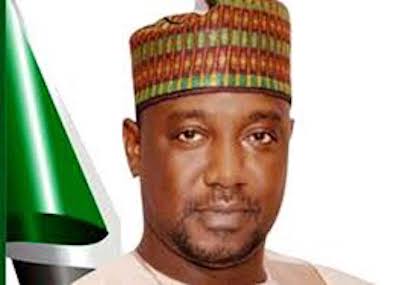Health
Gov Sani Bello Flags Off Cervical Cancer Screening; Services in Niger

From Dan Amasingha, Minna.
In an apparent bid to reduce the prevalence rate of cancer as a global menace, Governor Abubakar Sani Bello has flagged off the Human Papilloma Virus (HPV) screening and cervical cancer prevention services at the Jummai Babangida Maternal and Neo-natal Hospital Minna.
The exercise which will be in phases will benefit 5,000 women across nine local government areas of the state at pilot stage.
Flaggin off the exercise, Governor Bello said he was aware of the effects of the killer ailment in the state and was determined to remedy the situation as well as meet the 90-70-90 World Health Organization (WHO) cancer elimination strategy in the state in addition to his administration’s continuous support to the State Uniiversity, in the area of research in cancer and other life-threatening diseases.
The governor maintained that providing good health care facilities and services in the state will continue to be a priority to his administration hence the budget estimates for health sector in 2022 was significantly captured.
“I have been briefed by my Commissioner for Health on the situation of the State on the prevalence level of Cancer. I am glad to inform you that we have already set in motion apparatus to remedy the situation as well as meeting the target set by the World Health Organisation (WHO).
“Our resolve is in setting an agenda towards a generation without cervical cancer in the State given the proper education, enlightenment and a suitable environment to fight this global menace. Health of our people is non-negotiable and of paramount importance to the soul of this administration”, he said.
He assured that his government will continue to work towards improving some of the negative health indices in the state even as he maintained that Health Care Delivery has witnessed significant changes in his administration.
The governor commended the Commissioner for Health, staff of the ministries and all development partners particularly CHAI, WHO, RAiSE Foundation and PPFN for their efforts and contributions to better the health sector in the state.
Also speaking, wife of the Governor Dr Amina Abubakar Bello disclosed that cervical cancer is the 4th leading cause of death among women affecting about 1.4 million women and the most common cancer with women living with HIV.
Dr Amina explained that about 80 per cent of cancer occur in the low-and-middle-income countries including Nigeria adding that at the global stage, the World Health Organization (WHO) is working towards the elimination of cervical cancer to achieve less than four new cases per 100, 000 women.
The wife of the governor and the founder, RAiSE Foundation said the strategy employed to eliminate cervical cancer includes; vaccination, screening and treatment of precancerous lesions and treatment through palliative care for invasive cervical cancer.
The Commissioner for Health, Dr Muhammad Makusidi noted that the project is in collaboration with the WHO, CHAI and RAiSE foundation pointing out that 15 state trainers and 100 healthcare workers from primary, secondary as well as tertiary healthcare facilities across the state have been trained on Cervical Cancer Prevention Services,
He said 10 healthcare facilities across the state will be used adding that consumables worth millions of naira have been procured to ensure smooth takeoff.
In their seperate goodwill messages, the World Health Organization, Planned Parenthood Federation of Nigeria and RAiSE Foundation commended the Niger state government for the laudable act describing it as the first in the country.
The organisations pledged their unalloyed support to the state government while calling on all relevant stakeholders and women to avail themselves the opportunity,stressing that early dictation of cervical cancer is highly preventable, treatable and can be cured.
The nine local government areas to commence the services are Chanchaga, Paikoro, Bosso, Gbako, Borgu, Suleja, Kontagora, Lapai and Mokwa.
Health
WHO Approves 2 New Vaccines to Protect Infants From RSV

The World Health Organization (WHO), on Friday, issued recommendations for two new immunisation tools to protect infants from Respiratory Syncytial Virus (RSV)They included a maternal vaccine, administered to pregnant women in their third trimester to protect their newborns.The other was a long-acting antibody injection for infants, which begins to protect within a week of administration and lasts for at least five months.
According to WHO, RSV is the leading cause of acute lower respiratory infections in children globally. It causes around 100,000 deaths and 3.6 million hospitalisations each year among children under the age of five, while infants under six months are most at risk.Alarmingly, 97 per cent of these deaths occur in low and middle-income countries, according to WHO.Although RSV can infect people of all ages, “it is especially harmful to infants, particularly those born prematurely,” a WHO official, Kate O’Brien, said.O’Brien added that around half of all RSV-related deaths occurred in babies younger than six months.Considering the global burden of severe RSV illness in infants, WHO recommended that all countries adopt either the maternal vaccine or the antibody injection as part of their national immunisation strategies.“These RSV immunisation products can transform the fight against severe RSV disease, dramatically reduce hospitalisations and deaths, and ultimately save many infant lives worldwide,” O’Brien said. (NAN)Health
UNICEF Promotes Menstrual Hygiene for Girls

The United Nations Children’s Fund (UNICEF) has encouraged girls to embrace menstruation with pride and confidence, recognizing themselves as vital contributors to humanity’s sustainability.
Mrs Aderonke Akinwole, Social and Behavioural Change Specialist at UNICEF, gave the advice during an event on Wednesday organised with the Nigeria Girls’ Guild and Lagos State Primary Health Care Board.
The event was held to commemorate Menstrual Hygiene Day (MHDay) and was attended by students from both public and private schools across Lagos.
With the theme ‘Together for a Period Friendly World,’ the event aimed to raise awareness and promote dignity in menstrual hygiene.
“When a girl begins menstruation, it should be celebrated. It signifies her transition into womanhood and her ability to sustain life.
“They should be proud, and seek accurate, helpful information to remain safe, clean, and healthy during their period,” Akinwole said.
She emphasised that girls must not feel ashamed, as menstruation is a natural part of womanhood and a symbol of female dignity.
She urged the state government to increase sensitisation efforts and include menstrual hygiene education in school curricula, religious settings, and community platforms.
Akinwole also warned against stigmatisation, especially from boys, and called for boys to be educated to respect menstruation as part of girls’ lives.
“Girls should understand the menstrual cycle even before it starts. This should be part of health education in schools, churches, mosques, and communities,” she said.
She explained that girls need awareness on menstrual hygiene management and should know how to prepare for their periods in a healthy, informed way.
Mrs Honfor Adesola, Director of Education at Lagos State Primary Education Board, commended UNICEF’s support in promoting menstrual hygiene and addressing issues affecting girls.
Adesola highlighted that maintaining menstrual hygiene is vital in preventing infections and ensuring comfort throughout the menstrual cycle.
She noted that the event also helped to raise awareness about the Human Papillomavirus (HPV) vaccine available free in health centres across Lagos.
“We’re here to mark MHDay and to engage girls on HPV awareness. The state government has provided the vaccine, and sensitisation must continue,” she explained.
She encouraged girls to discuss the HPV vaccine with their parents to gain consent, ensuring protection against cervical cancer.
“The vaccine is safe, effective, and accessible in state facilities for girls aged nine to fourteen, but many have not yet been vaccinated,” she added.
Meanwhile, Ethagah Divine, Head Girl of New Estate Baptist Secondary School, Surulere, called on NGOs to provide sanitary pads for girls.
She urged more campaigns and rallies to distribute free menstrual products, like UNICEF did, to promote hygiene and dignity during menstruation.
Miss Emmanuella Azubuike, a student of the same school, expressed gratitude to UNICEF and partners for the impactful menstrual hygiene awareness event.
“This programme has expanded my knowledge on menstrual hygiene and HPV. More NGOs should support these campaigns to reach and educate more young girls,” she said. (NAN)
Health
Soludo’s Wife Establishes Pad Banks in 300 schools

Wife of Anambra State Governor, Dr Nonye Soludo, says she has established pad banks in 300 schools across the state as part of her pet project, Healthy Living Initiative.
Mrs Soludo disclosed this in a message in Awka on Wednesday to mark the 2025 World Menstrual Hygiene Day.
She said that the initiative was her own approach to helping school girls whose academic focus could be affected during menstruation and related emergencies.
Mrs Soludo stressed the need to provide immediate solutions for menstrual emergencies in schools, so that girls caught off guard could confidently rely on the pad banks.
“Official data say that an estimated 37 million women and girls in Nigeria are unable to afford sanitary pads and only rely on unhygienic alternatives.
“The data reinforce World Health Organisation and United Nations Children’s Fund finding that poor water, sanitation and hygiene infrastructure hinders safe and dignified menstruation for women and girls.
“Other data say that only two in five schools globally offer menstrual health education and just one in three have bins for menstrual waste.
“These figures challenge key stakeholders to find practical solutions to address the root of the problem while the situation remains reversible.”
She called for intensified campaign to reach more women and girls currently facing menstrual hygiene challenges.
The governor’s wife noted that the growing number of women, especially girls, in urgent need of menstrual support makes it essential for stakeholders to re-strategise their campaign approach.
According to her, menstrual health remains the right of every girl-child.
She encouraged girls at the designated schools participating in the pad bank project to use the supplies with confidence.
Mrs Soludo assured them that her NGO was fully committed to restocking any of the pad banks that run out of sanitary products.(NAN)





























